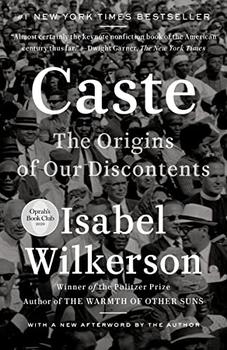Page 1 of 1
There are currently 4 reader reviews for Caste
Write your own review!
 Cathryn Conroy
An Extraordinary Book That Is So Well Written and So Compelling That It's Hard to Put Down
Cathryn Conroy
An Extraordinary Book That Is So Well Written and So Compelling That It's Hard to Put Down
I learned so much from this book! And the reason is simple: perspective. Pulitzer Prize-winning author Isabel Wilkerson tells the story of caste and racism both in broad, sweeping historical terms as well as through poignant, troubling, tragic, and heartrending personal stories.
This book is a fascinating examination of a trifecta of caste systems: Indian Dalits (the so-called "untouchables,"), Jews in Nazi Germany, and Blacks (primarily but not exclusively) in the American South—from the beginning of slavery to today. The history, commentary, and human stories are intertwined, which shockingly shows how similar these different caste systems really are.
This is more than race. This is more than hatred. This is more than prejudice. The United States has a caste system to this day, but the American caste system is even more insidious than that in India or Nazi Germany because it is based solely on the color of one's skin. How that caste system permeates everything in our society is something you may never have fully considered or understood—until you read this book.
Most telling of all is Wilkerson's detailed explanations of how these caste systems developed, why they continued with the encouragement and support of those outside the lower castes, why such deep-seated prejudice and hatred continue to exist and, as such, lead to the perpetuation of the caste system. Exhibit A: How racial attitudes of Barack Obama's presidency led directly to the election of Donald Trump.
And here's a stunning fact: Before embarking on their diabolical quest to first cast out and eventually attempt to eliminate the Jews, the Nazis carefully studied how Southern Americans treated Blacks in the 1930s and then based what they did on the American system.
This book is so well written and so fascinating that it's actually hard to put down, something that's not typically said about historical nonfiction.
Reading this book gave me a more educated perspective, a deeper knowledge, and a more fine-tuned cultural awareness. And that is the power of reading: Minds can be changed with insight. This is an extraordinary book.
 CarolT
Thought-provoking
CarolT
Thought-provoking
Wilkerson's easy to read prose kept me reading, but the topic kept me up nights. Everything she says is true. So, when I wonder about a "lower caste" person's promotion, am I wondering because she really isn't as qualified as other candidates, or because she's lower caste? And what, exactly, can I do to improve things? Is just the fact that I stop to think enough?
PatCarole
Caste -- Important but too wordy
I finally finished Caste this morning -- 6 weeks after starting it. (This included a midway break during which I read Hamnet by Maggie O'Farrell.) Caste is an important study of where the United States stands in 2020 with regard to race and how we got here. I loved the comparisons to India and the Third Reich which lent a perspective to the continuous racial divide existing in the U.S. Wilkerson's exquisite writing style is what allows the reader to persevere in reading this long book with too much repetition on a very tough subject. I am glad that I read Caste but I only enjoyed parts of it. I think the author could have made her point -- which is an important one -- with fewer words. Perhaps this would have given appeal to a wider audience.
Anna Rowe
Good-but not what I expected
I was a bit disappointed in this. After reading and admiring The Warmth of Other Suns a few years ago, I was really looking forward to this new book and thought the idea of looking at caste was an interesting approach with a broader scope than just focusing on race inequality. This is where the book failed for me. It was filled with dozens of examples, often one right after another, of blatant injustices that the author referred to as caste, but appeared to me as racial injustice. I think the examples are important but the whole book began to feel like a racial rant at some point. I was specifically looking for an explanation of how caste is different from, but equally as damaging as racial discrimination but the book really reduced itself to a book about race and the political implications of that. Now this is a worthy read for that alone, but it fell short of addressing the ideas I was interested in. I also thought the book was a bit of a structural mess. I didn't find that it progressed with any purpose toward a conclusion. I would still recommend it because it has a lot to offer, but unfortunately it didn't offer what I was looking for.
